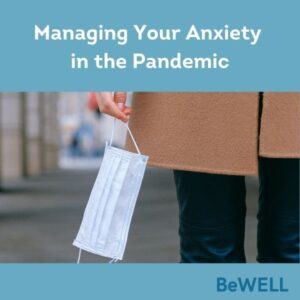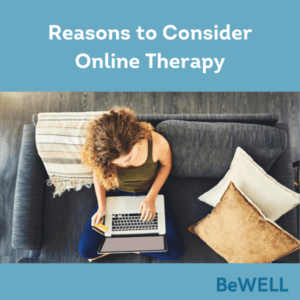Looking back at 2020, who would have thought? For millions of people, the pandemic has increased their anxiety in multiple areas of their lives. Some who would typically experience the once in a blue moon feeling of anxiety are now starting to feel like it is more of the norm. Then for others who could not have imagined their higher levels of anxiety getting any worse have also experienced an increase. But there’s still hope, here are some tips on how to manage your anxiety in the pandemic!
Often, feelings of uncertainty and fear of the unknown cause us to be on high alert. This is where anxiety often comes in! Creating a sense of normalcy can help. As we begin to identify the various ways that anxiety can show up and what to do about it, it’s important to remember that our needs are also constantly changing. The hope is that you will find these tips useful and seek resources to manage your anxiety in the pandemic.
Reality Check: Anxiety is a normal feeling. However, like anything else, there has to be a balance. Heightened anxiety that has not been properly addressed can be harmful to our mental health. If this is the case, it is important to seek professional support from a licensed mental health provider. Not everyone who has experienced some form of anxiety requires a mental diagnosis.
Anxiety can be a helpful way to make you aware of your triggers. When anxiety starts to kick in, it is like our internal alarm system has gone off; it wakes us up, it’s constantly trying to get our attention. Why did it alarm go off? What should you do? We all have different triggers caused by people, events, or situations that we cannot always avoid but can make adjustments to live a life that allows us to show up as our most authentic selves and feel good about it.
How have you addressed feelings of anxiety in the past?
Some questions to reflect on are:
- In what areas of my life do I tend to experience anxiety or be most anxious?
- Can I identify what my triggers are?
- What approaches have I taken to address my anxiety? Does this approach work for me? When was this helpful for me? What could be more helpful?
- How long have I tried this/each approach? Was that enough time for me? Should I give it another try?
- What am I willing to try that I have not yet given a try?
Asking yourself these questions can clarify what styles or approaches may have worked for you in the past and what did not.
What are some of the areas causing anxiety for people during the pandemic? How can this knowledge help you manage your anxiety in the pandemic?
School and Work (While Remote)
Tips:
Create a todo list. Creating a todo list is another way to prioritize and streamline your thoughts and see what you have to get done more clearly. Once you have your to-do list together, you can start identifying which items you would like to check off first. For some, it may be best to start with smaller tasks. For others, it is the opposite. Either way, as you check items off your list, it allows your mind to feel accomplished.
To manage your anxiety in the pandemic, you must also manage expectations for yourself and others. If you’ve already learned how to manage expectations, you are well on your way! Managing expectations will look different for everyone but can include approaches such as understanding ( and when necessary) sharing your priorities with others, asking clarifying questions, and communicating realistic timelines.
Personal Relationships
Tips:
Think about if you are ready to spend time with others: Sometimes, if we are not mindful, we can unknowingly find ourselves in situations where we are not comfortable. Consider where you are now and what will and will not work for you. Avoid visiting/ going places that trigger negative emotions.
Consider if the scheduled time works: Sometimes, family, friends, and others have a hard time understanding that you are busy, working, or just don’t have time to speak at the moment. Now add a pandemic to that and there may very well be times that you want to just have some good ‘ol alone time and that’s ok. It is important to keep this in mind to not to feel bombarded by others’ thoughts or conversations at any given time.
Wanting to feel a sense of normalcy
Tips:
Create a schedule. Creating a schedule helps people feel motivated and allows them to have something to look forward to regularly. Being able to prioritize your schedule is also key as you seek to manage anxieties.
Implement a morning and evening routine. Routines help create a sense of normalcy and help set the tone for a day and night that feels more organized. You can use this time to journal, pray or meditate. When possible, try to avoid activities that can consume your thoughts, such as answering phone calls first thing in the morning, responding to emails, and scrolling through social media before taking time for yourself. At night it is important to find ways to relax the mind and body as well. Shutting the computer down is a great way to conclude the end of the. This is also true for television. The more we stimulate our minds, the more thoughts are constantly being produced. For this reason, many also struggle with morning anxiety. Some of the same routines from the morning could also work for you at night.
Incorporating the following practices can help you feel more grounded and prepared for the days, weeks, and months ahead. For some, the pandemic has slowed things down, and for others working remotely, it has felt as though we have yet to have an opportunity to catch our breath.
Remember that self-care allows you to check-in with yourself. Don’t deny yourself. Lean into what your mind, body, and soul need at the moment. Healthy coping mechanisms can alleviate your anxiety. Sometimes it’s important to affirm what you are doing. Give yourself a pep talk, remind yourself that you are enough, and do the best you can! No one knows you better than you. It takes intentionality, like many of the other tips being shared.
For more information check out the replay of our “Managing Your Anxiety in the Pandemic” seminar.



